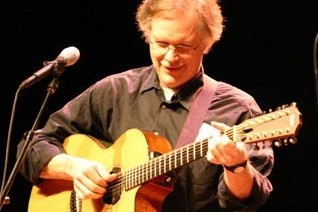
- JB
- Herron (center) surrounded by Raleigh-Frayser natives (l to r) Matt Kuhn, Dennis Dugan, Karl Schledwitz, and Bill Haltom
While being feted by longtime Memphis friends Bill and Claudia Haltom on his birthday at the Haltom’s Hein Park home Thursday night, 8th District congressional candidate Roy Herron couldn’t resist telling the crowd of well-wishers on hand about a gaffe made earlier Thursday by Democrat Herron’s Republican opponent, Stephen Fincher, a stay-away from Memphis for most of the campaign year.
Gathering four friends from the Raleigh-Frayser area around him to undescore his point, Herron, a state senator from Dresden, said, “My opponent was in my home county, Weakley County, the first time they let him out from under the wraps, the first time he’s been interviewed by a reporter from Memphis or Jackson or an AP reporter this whole month.” He then warmed to his punch line. “He managed to convey that he did not know that any of the city of Memphis was in the 8th Congressional District. You cannot make this stuff up.”
The birthday celebrants laughed appreciatively. “What else doesn’t he know?” a female voice was heard to say.
Herron went on: “I’ve known about Frayser for 50 years now. My wife grew up in Memphis. If you look at the 8th District race and want to make one clear distinction, there’s one candidate that knows that Memphis is in the 8th District, and one that doesn’t, and I’m the one that does. “He then nodded toward wife Nancy, standing nearby. “And there’s no candidate in any race that’s more indebted to Memphis. I married the best, the kindest, the sweetest in the whole world that came from Memphis. “
He finished up by saying, “I’ll be honored to represent the city of Memphis, and if you give me the opportunity, ladies and gentleman, I’ll work from Can to Can’t to represent you and the rest of the people from this congressional district.”
The Fincher remarks referred to by Herron occurred during an interview with Commercial Appeal reporter Richard Locker after Fincher had addressed students at the University of Tennessee at Martin.
Locker asked Fincher what he might do for Memphis and Shelby County if elected, and the Republican candidate, a farmer/gospel singer from Frog Jump in Crockett County, responded, “I’m in Memphis a lot and see lots of folks. They’re close to us and part of the district…. The city of Memphis is not in. But we’re going to work for the state and country to do what we can. Memphis is a key part of the 8th District. I mean it’s close to us.”
When Locker asked Fincher for clarification on whether he thought parts of Memphis lay within the 8th District, Fincher responded that the district lines extended into Shelby County. “Just into the county part. I don’t think we have the city part. I don’t think the city of Memphis.”
At that point, according to Locker’s article about the incident in the CA, Fincher aide Paul Ciaramitaro prodded his boss, reminding him that Frayser, a part of Memphis, lay within the 8th District. Fincher then corrected himself, saying, “Frayser is. Ok, yes.”
Neither he nor Ciaramitaro would go on to mention the fact, nor was it remarked on in the article, but Raleigh, which adjoins Frayser, also lies within the 8th District.



